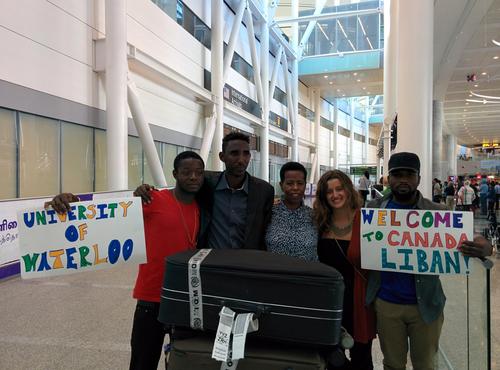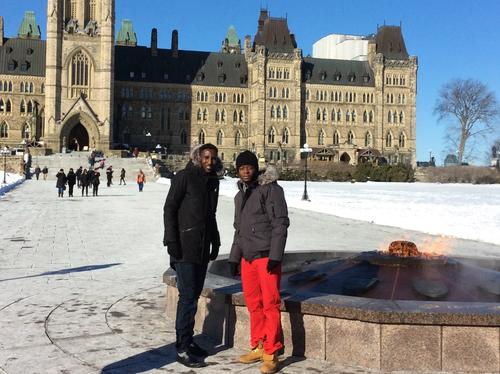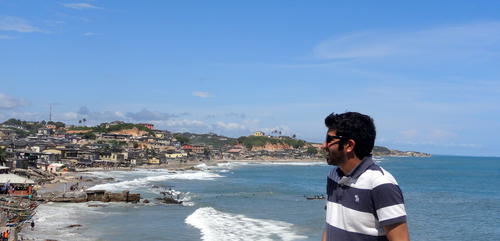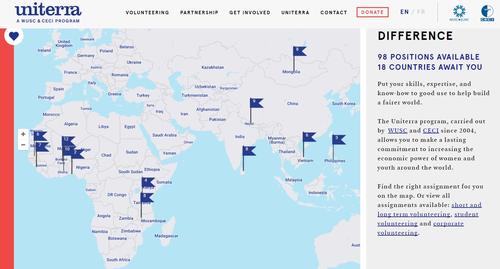It started with a gift.
It was 2012 and Adam Chagani had recently arrived in Twifo Praso, a rural community in Ghana, West Africa. The International Development (INDEV) student had recently begun an eight-month volunteer placement.
As he walked the streets of his new community, two young men offered him a coconut. When he tried to pay them, they insisted, "No. You're new here. This is for you."
It was the start of a friendship. And the relationships Adam built with the people of Twifo Praso have guided his career path ever since.
A 10-year partnership for social change

Building relationships is also a key focus for institutions that work for social change. That’s why, for more than 10 years, the University of Waterloo has partnered with World University Service of Canada (WUSC), a non-profit organization that focuses on education, employment, and empowerment opportunities for youth.
It’s a relationship that began in 2006, when students voted to participate in a WUSC initiative that brings young refugees to study in Canada. The partnership expanded when Waterloo and St. Paul’s chose WUSC to provide fourth-year internships for the new, jointly offered INDEV program.
Through this partnership, our students have been able to experience both the challenges and richness of lives very different from their own. They’ve put theory into practice. And they’ve learned resilience, resourcefulness, and courage from the people they’ve encountered.
Issues come to life through the Student Refugee Program

WUSC’s two flagship programs are the Student Refugee Program (SRP) and Uniterra (a WUSC and CECI program, funded by the Government of Canada through Global Affairs Canada). Uniterra is Canada’s largest international volunteer program.
In 2006, Waterloo students formed a WUSC Local Committee to support the SRP on campus. St. Paul’s was the first residence to partner with the committee, providing refugees with accommodation plus educational and community support. Today the local program is based at St. Paul’s.
What’s unique about the SRP is that students actively participate in sponsoring and supporting refugees. All Waterloo students donate one dollar per term to the program, with St. Paul’s and Conrad Grebel students contributing additional funding through a voluntary levy. But what students receive is often more valuable than the money they give.
"[The SRP] has stimulated a lot of student interest about refugee issues, social justice, and conflict resolution,” says Gráinne Ryder, INDEV Lecturer and a longtime SRP staff advisor.
“Issues of war and displacement become real for students once they’ve actually met other young people with those experiences. And it’s great to see them learn and grow by helping sponsored students adapt to life in Canada.”
Bringing energy and enthusiasm to local partner projects

In 2007, as staff at St. Paul’s and in Waterloo’s Faculty of Environment sought internship opportunities for the new, jointly offered INDEV program, they turned to Uniterra.
Through its Students Without Borders stream, Uniterra provides students from Canadian universities, colleges and CEGEPs with international volunteer experiences. Part of the attraction for St. Paul’s was WUSC and CECI’s network of local development organizations in 14 countries that provides students with practical work experience.
Students Without Borders gives volunteers the chance to work on meaningful projects that have been identified by Uniterra partners who understand the local context best.
“Our partners appreciate the energy and enthusiasm that the students bring,” says Vicki Campbell, Uniterra’s Talent Acquisition Specialist. “Students have the opportunity to put theory into practice. And they’re familiar with technology and can bring innovative ideas to challenges, which our partners really appreciate.”
From passion project to career focus

That was certainly the case for Adam, who says he “learned by doing.”
Working with a Ghanaian NGO, Action for Rural Education, he assisted the organization in helping people access HIV treatment and services. He also helped to design education programs to address the stigma surrounding the disease. And while learning about development, he encountered the realities of life in a developing country.
"Some days, I'd be working on a report and there would be no electricity. So I'd go out and walk around town. I'd stop and have conversations with people.”
Those conversations soon turned into friendships, especially with Daniel and Abed, the two young men who had welcomed him with a coconut.
“Every day we’d hang out,” Adam says. “Sometimes I’d go to their homes and visit their families and we’d cook together.”
Adam began to get insights into his friends’ lives and the challenges they faced. Unable to afford tuition, their education ended in primary school. They were able to earn a little money doing small jobs in the community.
Like many young people around the world, Abed and Daniel enjoyed sharing music. But in the absence of reliable Internet service, they would share it on USB sticks. Adam wondered if educational materials could be exchanged in the same way, not only between his friends but with other students whose education was frequently disrupted by political upheaval.
On occasional visits to Accra, Ghana’s capital, he would download videos from government sources and the Khan Academy. Daniel and Abed helped him sort them by subject and grade level.
“It became a passion project, a chance to test how self-learning worked.”
Unfortunately, Adam’s placement ended before he had a chance to see the project take root. But the idea of linking technology and social innovation stayed with him.
After graduation, Adam headed to Kenya, the heart of 'Africa’s Silicon Valley,’ for what was to be a three-month research project in the health sector. Inspired by Nairobi’s social and tech entrepreneurship scene, he ended up staying for more than three years.
In Nairobi, Adam found startups that were using technology to address social issues. He worked with several of them in roles that ranged from research to business development. Then a few months ago, he moved to New York to pursue graduate studies in strategic design.
“My experiences in Ghana and Kenya have built on top of each other,” Adam says. “I see myself working at the intersection between international development, technology, and human centred-design. I hope to design creative projects and services that support people’s needs and aspirations for a better quality of life.
Looking for meaningful volunteer opportunities?
Learn more about how your skills can make a positive impact through WUSC volunteer opportunities.
“We’re all one”
Like Adam, INDEV students who have completed international placements through Students Without Borders continue to reap the benefits once they return home. They join a network of more than 5,500 Uniterra alumni and gain career-boosting connections.
As Gráinne notes, for many INDEV grads, “It’s the personal relationships they value over everything else about the SWB experience. That drives the need to work for social justice or environmental sustainability in ways that stay with them through their careers.”
“I loved the feeling of being part of a community, the human connections,” Adam adds. “There’s all these layers — different cultures, religions, languages. But at the end of the day, you realize that we’re all one.”










